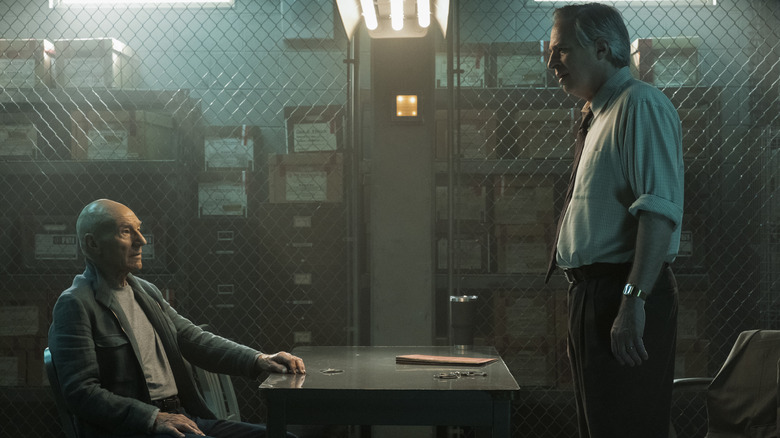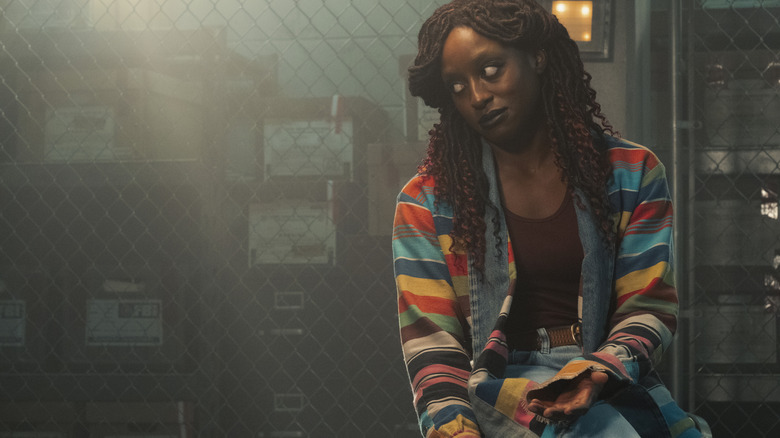Jean-Luc Enlists His Own Version Of Agent Mulder In Episode 8 Of Star Trek: Picard Season 2
It seems "Star Trek: Picard" has officially reached the "spinning its wheels" phase of its current season.
In the first two episodes of this season, "Picard" wisely laid out a single, clear mission for its characters: Go back in time to the year 2024 and investigate the single event in history that caused humanity to begin down a dark path of galactic fascism. Our heroes got to experience Fascism World in person (thanks to the impish cosmic tinkering of the trickster god Q, played by John De Lancie), and Picard (Patrick Stewart) briefly occupied the role he would have played in the alternate timeline: that of Lord High Executioner. It was a promising premise that could have played very strongly into the politics of the present, warning humanity that we are at a turning point in history: Choose between committing multiple genocides or Roddenberry's optimism.
In episode 8 of season 2, entitled "Mercy," we're three episodes past that turning point. In a rather limp conceit, the pivot in history was merely about whether an ancestor of Picard's (Penelope Mitchell) would go on a space mission or not. If she refused — as Q was trying to get her to do by acting as her psychiatrist — then humanity would plunge into genocide within a generation. If she accepted — as Picard ensured she would by giving her a pep talk at a party — then Roddenberry, ho! A disappointingly simple solution, as audiences in 2022 aren't living in the middle of a space race, and underfunded astral travel projects don't capture the public's imagination anymore. And, no, there is no speech in "Star Trek: Picard" about how Renée Picard's mission was destined to change the public's perception of space travel.
So the unsatisfying conclusion has been reached, and the plot now has one mystery left: Why did Q teleport Picard and co. into the fascist timeline to begin with? The answer is given, and, dear readers, it is just as disappointing.
Q's motivation
Caution: Spoilers ahead.
At the end of episode 7, Picard and Guinan (Ito Aghayere) were apprehended by 2024's own Agent Mulder, a character named Wells (actor Jay Karnes who, incidentally, played a Starfleet lieutenant in the fifth season of "Star Trek: Voyager"). Picard and Guinan are taken to a top-secret FBI bunker where they are interrogated. Picard is questioned by Wells, and has the good sense to play dumb. Wells eventually reveals that he became an FBI agent because of a boyhood run-in he had with a pair of visiting Vulcans. Just as the Vulcans were initiating a mind meld to erase Wells' memory, they were beamed away, leaving Wells obsessed with finding aliens. Figuring that Wells already had a run-in with space visitors (prior to "First Contact"!), Picard spills the beans. He is from the 25th century, there is an evil robot on the loose in Los Angeles, and he needs the FBI's help. Picard's "Will you help me" speech is riddled with clichés, and wouldn't have felt out of place in a corny comic book movie from the 1990s.
Guinan, meanwhile, is questioned by Q himself, posing as an FBI agent. It is to Guinan that Q will reveal his ultimate motivation: Q, it turns out, is dying. The Q Continuum is supposed to be immortal, so it came as quite a shock to both Guinan and to Q. De Lancie gives a good performance, talking about opening himself up to the possibility of glorious oblivion, but eventually had to face that he was merely withering away. Because he was facing his own mortality, Q decided to put Picard in a trap one last time just to see if his old Starfleet friend could wriggle his way out.
This is disappointing. Q instigated the second season of "Star Trek: Picard" out of the boredom wrought by a midlife crisis? This doesn't seem like a very becoming motivation for an immortal deity. Perhaps Q would have visited Picard, but to discuss mortality, not to put him through the wringer — checking notes — for fun. If Q were messing around, surely he would have teleported Picard into Sherwood Forest again.
The reveal of Q's motivation also robs the central plot of its stability. Did Q know that Picard would think to infiltrate a party? Did he know the Borg Queen was needed to go back in time? Did Q intend for the Borg Queen to take over the mind of Dr. Jurati (Alison Pill)? Q was giving hints to the genetic scientist Adam Soong (Brent Spiner). What was the plan there? Did Q know about the Watcher? Did he know Picard and co. were going to visit the locales they did? It's all terribly thought out.
Borg Queen on the loose
Oh yes, and, as mentioned above, there's a Borg Queen loose in Los Angeles. Dr. Jurati's body has been taken over by the cyborg villainess, and now intends to cause mayhem in 2024. Raffi (Michelle Hurd) and Seven (Jeri Ryan) are on her trail.
Seven, we state explicitly now, has no Borg implants any longer. She is fully human again. Again: Did Q plan for that? Why allow Seven to remain human when Picard retained his golem android body? I know, I know. Picky, picky, picky.
The Borg Queen cannot assimilate people into the Borg, however, as she has no assimilation nanites in her blood to infect others, so she — and here we emit a very long, heart-rending sigh — had to eat car batteries to get essential metals into her bloodstream, so she can produce the nanites that she needs to — I'll stop there. Needless to say, "Star Trek: Picard" is deep into shlock territory. The sight of Alison Pill in her killer red dress, with battery acid spilling down her chin as she dreams of world conquest ... It all feels so silly now. The Jurati/Queen character will eventually beat up Raffi and Seven and somehow find her way to Adam Soong where they will — another sigh — assemble a team of military mercenaries ripe for Borg assimilation. This is something Soong had access to, I suppose.
The episode ends with the Jurati/Queen gearing up for world conquest/assimilation with her military lapdogs. I guess the battery lunch helped. While this should feel like the ramping up of a threat, recall that we're essentially in the falling action of the series. New plot complications aren't so much complicated as they are filler until the showrunners can complete a season. Just keep spinning those wheels. We'll get back to the 25th century soon enough.
Guinan's psychic shimmer and other details
With so many illogical plot decisions and silly motivations, one might fall into the dark side of recounting annoying little details to maintain sanity. Plot inconsistencies and ill-thought-out details aren't at all important if the story or the characters are engaging. When one disengages, one starts nitpicking.
As long as that's true...
Guinan can talk to Picard psychically. Indeed, Guinan seems to host numerous superpowers never previously alluded to in "Star Trek." Guinan previously gained her dramatic appeal through her compassion and ability to listen. Now she is being turned into a capable badass, one of the worst decisions for that character.
The idea that a Borg only needs to eat metal in order to become capable of assimilating people is a pretty bad idea. The dialogue explains that she needs base metals in her bloodstream to make nanites, but what is constructing the nanites? Even using the rules of "Star Trek's" own imaginary technology, this is a silly idea.
Adam Soong has been trying to create a perfect clone, having made multiple copies of his adult daughter (Isa Briones). His current daughter finds she is only six years old, and had childhood memories implanted. Briones played a similar scene in season one when her character Soji discovered she was an android.
It's clear the Adam Soong story will have something to do with the Eugenics Wars (an established event in "Star Trek"). A pity that it was a Borg villain — and not the mere hubris of humankind — that brought about said wars.
Sigh. Only a few more to go.



